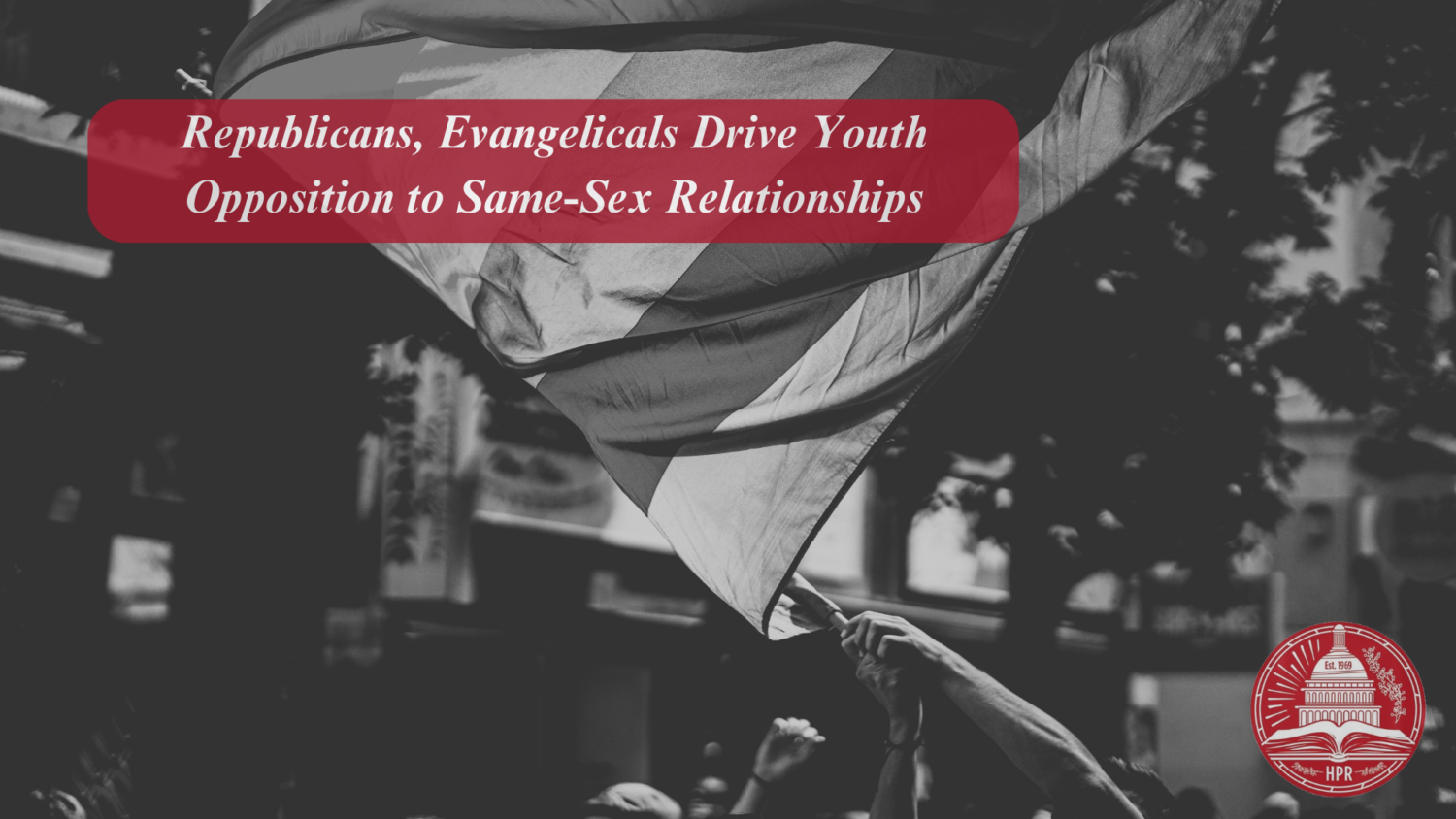The last several years have seen a marked increase in vitriol directed toward the LGBTQ+ community. Age-old conspiracies that smear LGBTQ+ people as “groomers” have gained traction after being legitimized by public figures. Right-wing politicians are rewarding those who advance these conspiracy theories, like Chaya Raichik, the creator of “Libs of TikTok,” with positions of political power. Nor is this homophobic turn simply a matter of rhetoric; according to the FBI, hate crimes against LGBTQ+ people have surged in recent years. Escalating threats to LGBTQ+ safety drove the Human Rights Campaign to declare a nationwide state of emergency for LGBTQ+ people in 2023.
Against this backdrop, the Spring 2024 Harvard Youth Poll has produced a concerning finding: 25% of young Americans agreed that “same-sex relationships are morally wrong.”
Quarter of young Americans opposed to same-sex relationships
It is important to note that the question does not ask whether respondents support gay marriage, or support LGBTQ+ history being taught in schools, or any hot-button “culture war” issue. The question asked whether respondents viewed same-sex relationships, as a whole, as morally objectionable. A quarter of young people said yes.
Opposition to same-sex relationships has remained fairly consistent over the last several years, standing around one-quarter of respondents even as almost one-fifth of respondents identify as gay, lesbian, bisexual, or another queer identity. In other words, one in four young people view one in every five of their peers as seeking fundamentally immoral relationships.
Majority of Republicans, evangelicals oppose same-sex relationships
Somewhat unsurprisingly, a strong party correlation exists within the data. Among Democrats, 12% agree with the statement that same-sex relationships are morally wrong, while 53% of Republicans agree. This clear partisan divide emerges in the context of the Republican Party’s recent efforts to target LGBTQ+ people, with the Texas GOP declaring that homosexuality is an “abnormal lifestyle choice” and leading Republicans like North Carolina Lt. Gov. Mark Robinson calling LGBTQ+ people “filth.”
Educational issues have formed the backbone of Republicans’ attacks in recent years. The Republican presidential primary served as a major battlefield, with candidates railing against “transgender insanity” in schools and vying for the support of homophobic hate group Moms for Liberty. As of this article’s release, the ACLU is tracking almost 200 anti-LGBTQ+ bills specifically focused on schools.
This rhetoric is nothing new, but it has a widespread effect. A Pew study from earlier this year found that a majority of American adults think parents should be able to opt their child out of learning about LGBTQ+ topics in schools. These data points suggest that for a majority of young Republicans, discussions about school policies are merely a veil for a deeper divide. It is not the visibility or specific actions of LGBTQ+ people that are being targeted, but their very existence.
Additional demographic correlations indicate which communities may be fueling this rightward turn. Among respondents who identified as “Fundamentalist/Evangelical Christians,” 66% agreed that same-sex relationships were morally wrong. The opposite balance appears among those with no religious affiliation, of whom only 7% agreed with the statement. This stark divide along religious lines is especially striking in light of PRRI’s March findings that 60% of Americans under 30 who left their childhood religion left because of their religion’s teachings on LGBTQ+ issues. These questions have become major wedge issues along religious lines, especially among young people.
Opposition to same-sex relationships tied to high religiosity
Other findings corroborate the idea that LGBTQ+ issues are a major religious wedge in particular. Among religious respondents who said that religion was “very important” in their own lives, 60% agreed that same-sex relationships are morally wrong. Among those for whom religion was “not very important,” only 12% agreed. Taken together, these data points suggest a common trend: The more religious a respondent is, the more likely they are to say that same-sex relationships are morally wrong.
This divide has taken the national stage in recent years, as questions over the participation of LGBTQ+ people in religious spaces increasingly define many Americans’ religious lives. Within the last few years, the United Methodist Church has lost one-quarter of its member congregations — thousands of religious communities — over the perception that it has been too liberal on LGBTQ+ issues. The Southern Baptist Convention, the single largest Protestant organization in the United States, has routinely expelled congregations for affirming LGBTQ+ people. The visibility of LGBTQ+ people has become such a polarizing issue that it is threatening to tear apart long-established religious denominations, and the presence of these divides among young people suggests that these schisms will not be easily reconciled.
As LGBTQ+ people come under increasing attack in the public sphere, the Harvard Youth Poll indicates that young Americans are not immune to the deep divisions plaguing the rest of American society. It seems abundantly clear that the rights and livelihoods of LGBTQ+ people will remain a major issue for some time to come.
Bureau of Ethical and Sensitive Reporting Chief




